
Proselytism is solemn nonsense, it makes no sense. We need to get to know each other, listen to each other and improve our knowledge of the world around us. Sometimes after a meeting I want to arrange another one because new ideas are born and I discover new needs. This is important: to get to know people, listen, expand the circle of ideas. The … | Pope Francis Continue reading Proselytism Is Solemn Nonsense Pope Francis

The Cynefin Framework | Dave Snowden Posts that link to this post We Humans Are Complex Human socio-technical systems are complexPeople: Dave SnowdenDave Snowden Management ConsultantPosts: Dave SnowdenCarpe Diem – Seize the Day Seize the day everyoneChanging People ** The challenge of trying to change peopleConversations Through the Cynefin Lens Unraveling the intricacies of everyday conversationsThe … Continue reading The Cynefin Framework Dave Snowden

What can we trust? Why is the ‘information ecology’ so damaged, and what would it take to make it healthy? video player The War on Sensemaking | Daniel Schmachtenberger (Rebel Wisdom) Comments Trusting Information The central message of this talk by Daniel Schmachtenberger is that we cannot trust any of the information in our global … Continue reading The War on Sensemaking I Daniel Schmachtenberger (2019)

Please stop saying you researched it. You didn’t research anything and it is highly probable you don’t know how to do so. Did you compile a literature review and write abstracts on each article? Or better yet, did you collect a random sample of sources and perform independent probability statistics on the reported results? No? … Continue reading Please Stop Saying You Researched It Linda Gamble Spadaro

Daniel Schmachtenberge is a founding member of the Consilience Project Daniel is a founding member of the Consilience Project, aimed at improving public sensemaking and dialogue. The throughline of his interests has to do with improving the health and development of individuals and society, with a virtuous relationship between the two as a goal. Towards … Continue reading Daniel Schmachtenberger A founding member of the Consilience Project

AustraliaAustriaBrazilCanadaChinaCzech RepublicEgyptFranceGermanyGlobalIndiaItalyJapanMexicoNetherlandsPolandSaudia ArabiaSingaporeSpainTurkeyUAEUnited KingdomUnited States As an Amazon Associate, I earn a small commission when you purchase a book via this site. Book Purchased: 22 September, 2020 Sense-making Methodology Reader: Selected Writings of Brenda Dervin Six Thinking Hats Tags: intelligence (23) | sense-making (42)Google Web Search Photo Credits: Midjourney (Public Domain)This page is part … Continue reading Sensemaking: What Makes Human Intelligence Essential in the Age of the Algorithm by Christian Madsbjerg

We each perceive things differently | Clip from An Ecology Of Mind directed by Nora Bateson People: Nora BatesonNora Bateson Filmmaker, writer, and educatorBooks: Nora BatesonComplex Problems Require an Entirely Different Approach in Assessment, and Action Nora BatesonNora Bateson Filmmaker, writer, and educatorWe Each Perceive Things Differently Nora Bateson, Tim KeaniniYou Can’t Build Community Nora … Continue reading We Each Perceive Things Differently Nora Bateson, Tim Keanini

We are in a constant, collective journey of storytelling, sense making, and creation. Knowledge is a conversation. It is not a static “thing,” but a continual process in motion, emerging in the shared communal learning space that arises between people. Every conversation reshapes our knowledge, modifying it to fit new circumstances, expanding it with new … Continue reading Sensing Our World Verna Allee

Brenda Dervin is a professor of communication at Ohio State University. Her research about information seeking and information use has led to the development of her sense-making methodology. Connecting with Specific Publics: Treating Communication Communicatively | Brenda Dervin WebsiteSense-Making Methodology InstituteWikipediaBrenda DervinYouTubeBrenda DervinGoogleBrenda DervinBooks: Brenda DervinAn Overview of Sense-making Research: Concepts, Methods, and Results to … Continue reading Brenda Dervin Professor of communication at Ohio State University

Distinguishing between misinformation and disinformation is crucial. Misinformation comes from those who genuinely believe what they say, while disinformation involves deliberate deception, cover-ups, or the spreading of falsehoods. Differentiating between them can be challenging, and even trusted sources may inadvertently spread misinformation. | David Gurteen Continue reading Distinguishing Between Misinformation and Disinformation Is Crucial David Gurteen

This book by Brenda Dervin is intended for studying users, audiences, patrons, patients, and clients in a variety of fields such as communication, cultural studies, library and information science, environmental studies, arts policy and education, and nursing. AustraliaAustriaBrazilCanadaChinaCzech RepublicEgyptFranceGermanyGlobalIndiaItalyJapanMexicoNetherlandsPolandSaudia ArabiaSingaporeSpainTurkeyUAEUnited KingdomUnited States As an Amazon Associate, I earn a small commission when you … Continue reading Sense-making Methodology Reader: Selected Writings of Brenda Dervin by Brenda Dervin (2003)

Purpose The purpose of this paper is to provide an overview of the Sense-Making approach to research – its assumptions, methods, and results to date. The intent is to provide this overview in a semi-outline form to facilitate its speedy use by the reader. No attempt is made in this paper to fully document all … Continue reading An Overview of Sense-making Research: Concepts, Methods, and Results to Date Brenda Dervin (1983)

For all our knowledge, we have no idea what we’re talking about. We don’t understand what’s going on in our business, our market, and our world. Knowledge Management shouldn’t be about helping us to know more. It should be about helping us to understand. So, how do we understand things? It’s through stories that we understand how the world works. | David Weinberger Continue reading For All Our Knowledge, We Have No Idea What We’re Talking About David Weinberger

The major problems in the world are the result of the difference between how nature works and the way people think. | Gregory Bateson Continue reading What Is the Root Cause of the Major Problems in the World? Gregory Bateson

video player The War on Sensemaking II | Daniel Schmachtenberger (Rebel Wisdom) The War on Sensemaking Video Series People: Daniel SchmachtenbergerDaniel Schmachtenberger A founding member of the Consilience ProjectPosts: Daniel SchmachtenbergerMultipolar Traps or Moloch Traps Acting against our collective interestsPollution of the Global Information Ecosystem The contamination of information with false and misleading materialThe Global … Continue reading The War on Sensemaking II Daniel Schmachtenberger (2019)

Karl Weick is an organizational theorist who introduced the concepts of “loose coupling”, “mindfulness”, and “sensemaking” into organizational studies. He is the Rensis Likert Distinguished University Professor at the Ross School of Business at the University of Michigan. WikipediaKarl WeickLinkedinKarl WeickYouTubeKarl WeickGoogleKarl WeickBooks: Karl WeickKarl Weick Organizational theoristTags: Karl Weick (1) | mindfulness (6) … Continue reading Karl Weick Organizational theorist

Shared meaning does not mean that people agree but that they understand each other’s perspectives well enough to accept them. There is only one way of achieving this, and that’s through real conversation. | David Gurteen Continue reading Shared Meaning Is Achieved Through Real Conversation David Gurteen

video player The War on Sensemaking III | Jamie Wheal (Rebel Wisdom) The War on Sensemaking Video Series Books: Jamie Wheal, Daniel SchmachtenbergerThe War on Sensemaking III, the Infinite Game Jamie Wheal (2020)Videos: Jamie Wheal, Daniel SchmachtenbergerThe War on Sensemaking III, the Infinite Game Jamie Wheal (2020)Tags: Daniel Schmachtenberger (20) | information (29) | information … Continue reading The War on Sensemaking III, the Infinite Game Jamie Wheal (2020)

To make better sense of the world, improve decision making, strategizing, and innovation we need to convene small groups of people to engage in creative conversations triggered by powerful questions. | David Gurteen Continue reading Making Better Sense of the World David Gurteen

video player The War on Sensemaking IV | Daniel Schmachtenberger (Rebel Wisdom) The War on Sensemaking Video Series People: Daniel SchmachtenbergerDaniel Schmachtenberger A founding member of the Consilience ProjectPosts: Daniel SchmachtenbergerMultipolar Traps or Moloch Traps Acting against our collective interestsPollution of the Global Information Ecosystem The contamination of information with false and misleading materialThe Global … Continue reading The War on Sensemaking IV, Pandemic & Conspiracy Daniel Schmachtenberger (2020)

A clear, succinct 5 minutes introduction to Dave Snowden’s Cynefin Framework by Jennifer Garvey Berger. Making Sense of Complexity – an introduction to Cynefin | Jennifer Garvey Berger Posts where this video is embedded Jennifer Garvey Berger Developmental coach and author The Cynefin Framework A conceptual framework to help make decisionsPeople: Jennifer Garvey BergerJennifer Garvey Berger Developmental … Continue reading Making Sense of Complexity – an Introduction to Cynefin Jennifer Garvey Berger (2017)

video player The War on Sensemaking V | Daniel Schmachtenberger (Rebel Wisdom) The War on Sensemaking Video Series People: Daniel SchmachtenbergerDaniel Schmachtenberger A founding member of the Consilience ProjectPosts: Daniel SchmachtenbergerMultipolar Traps or Moloch Traps Acting against our collective interestsPollution of the Global Information Ecosystem The contamination of information with false and misleading materialThe Global … Continue reading The War on Sensemaking V Daniel Schmachtenberger (2020)

Abstract Background Those attempting to implement changes in health care settings often find that intervention efforts do not progress as expected. Unexpected outcomes are often attributed to variation and/or error in implementation processes. We argue that some unanticipated variation in intervention outcomes arises because unexpected conversations emerge during intervention attempts. The purpose of this paper … Continue reading The Role of Conversation in Health Care Interventions Enabling sensemaking and learning
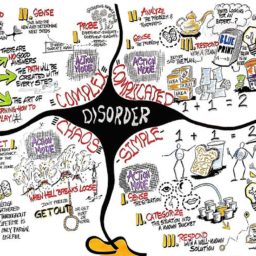
Constraints in Complex Systems Complex Adaptive Systems Vs. Complex Responsive Processes ** Close Pop-up all posts in this chapter What’s the Vibe? Please be patient as this may take up to a minute to load… Close The Cynefin framework helps you make better decisions by helping you understand your situation/context and use an appropriate decision-making … Continue reading The Cynefin Framework A conceptual framework to help make decisions

The Difference Between Sense-making and Meaning-making What Are Beliefs? Close Pop-up all posts in this chapter What’s the Vibe? Please be patient as this may take up to a minute to load… Close If we are to create a better world, we need to make better sense of things and improve the decisions we make, … Continue reading Introduction: Knowledge Delusion We delude ourselves about what we know and how we make decisions
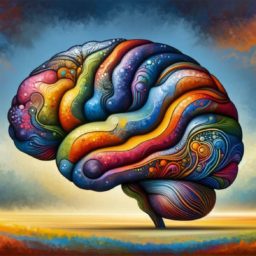
Tacit knowledge is a type of knowledge that is difficult to express or communicate through words. It is a vital component of human expertise and plays a crucial role in enabling us to adapt to new situations, solve complex problems, and drive innovation and progress. Continue reading The Importance of Tacit Knowledge Tacit knowledge is knowledge that is difficult to transfer

Deliberative Democracy ** Tolerance Is A Social Contract, Not a Moral Absolute Close Pop-up all posts in this chapter What’s the Vibe? Please be patient as this may take up to a minute to load… Close Freedom of speech is a principle that supports the freedom of an individual or a community to articulate their … Continue reading Freedom of Speech Freedom of speech is not just another value

Knowledge and Information ** The Knowledge Delusion Close Pop-up all posts in this chapter What’s the Vibe? Please be patient as this may take up to a minute to load… Close The argumentative theory of reasoning proposes that reason did not evolve to help us to reason individually but to reason together – in other … Continue reading The Argumentative Theory of Human Reason We did not evolve to reason individually but to reason socially


Pollution of the Global Information Ecosystem Filter Bubbles, Epistemic Bubbles and Echo Chambers Close Pop-up all posts in this chapter What’s the Vibe? Please be patient as this may take up to a minute to load… Close Uncertainty refers to situations involving imperfect or unknown information. Uncertainty refers to situations involving imperfect or unknown information. … Continue reading Uncertainty ** Uncertainty refers to situations involving imperfect or unknown information

V. Nurture Community I. Take Responsibility Close Pop-up all posts in this chapter What’s the Vibe? Please be patient as this may take up to a minute to load… Close The problem – our world is a mess. The context – our world is complex. The outcome – our old ways of working are failing—the … Continue reading Introduction: Principles of Conversational Leadership The Principles of Conversational Leadership

Motivated Reasoning ** Introduction: Knowledge Delusion Close Pop-up all posts in this chapter What’s the Vibe? Please be patient as this may take up to a minute to load… Close Sense-making and meaning-making are two terms that are often confused or used interchangeably, but they have distinct meanings. Sense-making Sense-making is defined in many ways. … Continue reading The Difference Between Sense-making and Meaning-making The terms have distinct meanings
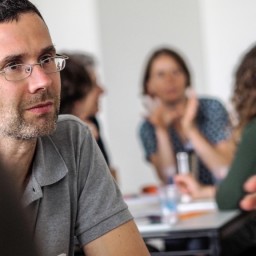
Knowledge Management has evolved since the mid-90s, shifting from managing information to building collective knowledge. The challenge lies in adapting KM practices to meet today’s complex needs. A four-level framework can provide a structured approach, helping organizations move from information management to supporting agency and communityship. Continue reading The Four Levels of Knowledge Management The relation between Conversational Leadership and Knowledge Management
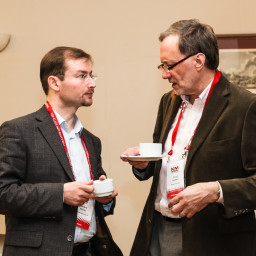
Connecting Minds Hard Conversation Close Pop-up all posts in this chapter What’s the Vibe? Please be patient as this may take up to a minute to load… Close There are two conversations. The face-to-face external conversations we have with other people. And the silent internal conversations or inner conversations we have with ourselves, in our heads. Thinking … Continue reading Thinking Together Talking with each other beats talking to ourselves
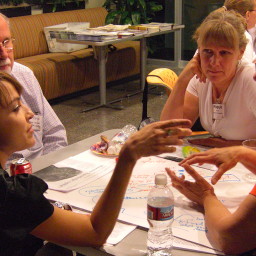
Speak Last Turn Monologues Into Dialogues Close Pop-up all posts in this chapter What’s the Vibe? Please be patient as this may take up to a minute to load… Close Speak in plain language: The language of many professionals is highly specialized and full of unnecessary jargon. This alienates many laypeople and those in other … Continue reading Speak in Plain Language We should use everyday natural language that everyone understands.
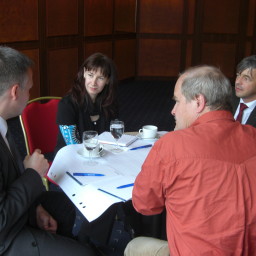
Knowledge Management tends to focus on the management of information in the belief that if we have more information, better quality information, and more accessible information, we will do our jobs better. This belief is just not true. We need more Continue reading We Know So Much but Understand So Little It is through conversation we make sense of the world
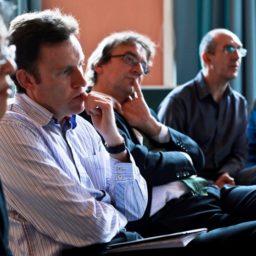
Conversation Is Not a Panacea for All Our Problems ** Oracy Close Pop-up all posts in this chapter What’s the Vibe? Please be patient as this may take up to a minute to load… Close Conversations occur spontaneously in various contexts with little or no thought about who should be involved or how they should … Continue reading Become a Conversation Architect A conversation architect designs and convenes conversations
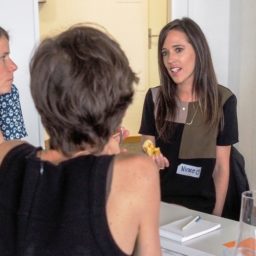
Learn by Talking Introduction: Conversational Learning Close Pop-up all posts in this chapter What’s the Vibe? Please be patient as this may take up to a minute to load… Close How do we make sense of the world so we can act in it? Collective Sensemaking How do we make sense of the world? Sense-making: … Continue reading Collective Sense-making The Knowledge Café is a powerful collective sense-making tool



















